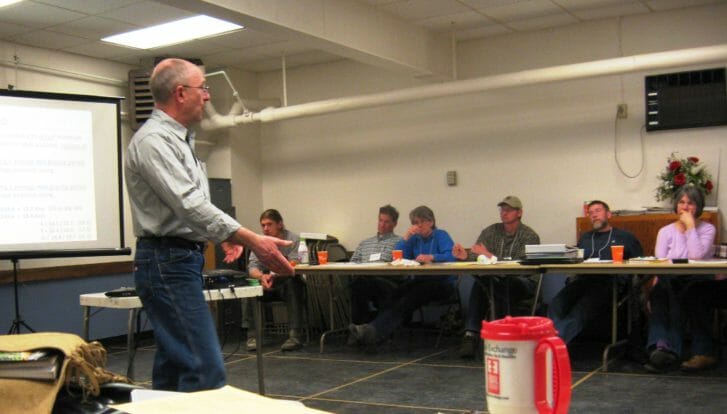Reflections on HM
Winter is the (relatively) slow season in the agriculture world. Chores and work certainly never really stop, but there is somewhat of a lull. But it seems that no one’s brains go on vacation. With the colder weather come the conferences! Between PFI’s own Annual Conference and Cooperator’s Meeting, and other groups’ efforts like the Driftless Region and Cornbelt Cow-Calf Conferences, MOSES, and slews of cover crop conferences, there are plenty of ways to keep one’s mind active and get new ideas for the next year. This past “conference season,” some of the most impressive and striking events for me have been the three Holistic Management workshops I’ve been to. With three down and one to go, I wanted to reflect on them briefly.
HM has a perception as being a bit on the unconventional side. It’s true…but really shouldn’t be. I doubt many farmers would say there’s a big disconnect between their lifestyle and their business of farming –in fact, that’s what we at PFI try and cultivate. Farming IS the lifestyle as well as the business. How many other occupations have that claim? HM also emphasizes this connection. The introductory course explains the background and perspective of HM, and walks participants through the development of a Holistic Goal. Far from just “what do you want to learn,” it brings together landowners’ goals for the land, finances, lifestyle, and community. Any changes in management, choices regarding new enterprises or purchases, or other options are weighed against the effects it will have on biology, profitability, and the family…ultimately asking, does this advance us towards our Holistic Goal? “You have to start with ‘who,’” an attendee took away.
The overall sense I get is of forward thinking. One of the more surprising things about HM has been the “oh duh” and “Why didn’t I think of that?” moments I’ve had. Why shouldn’t on-farm decisions be ranked against your goals for the land and profits and family? Financial Planning through HM goes beyond accounting for your costs when developing a plan – you plan for and account for your desired profit as well. Well, why not? “I gained a whole new perspective on what ‘profitable’ means,” a participant remarked. Grazing Planning isn’t about how many cows you can graze on a pasture and for how long – it’s about how long you should graze those cows, given that you need to provide a certain amount of rest, to ensure that the pasture recovers so you can graze the cows again. This makes sense once you hear it – but isn’t often how planning is done. Planning backward – starting with known ‘obstacles’ like unavailable paddocks at certain times of the year, and scheduling grazing in reverse starting from that point – makes it easier to get the animals where they’re needed when they’re needed. But, as attendees noted, it’s unexpected to think of it that way at first.
Much of the strength of HM comes down to having a plan. The workshops help you go through steps and develop these plans. Having a set process to work through the common issues, is what makes HM work for those who employ it. HM will not tell you how to manage your farm or run your business; it provides a framework for making decisions that lead to management in a way that advances your goals. “Instrumental for any walk of life,” one attendee noted; another said it could “help or save or revolutionize your operation.”

